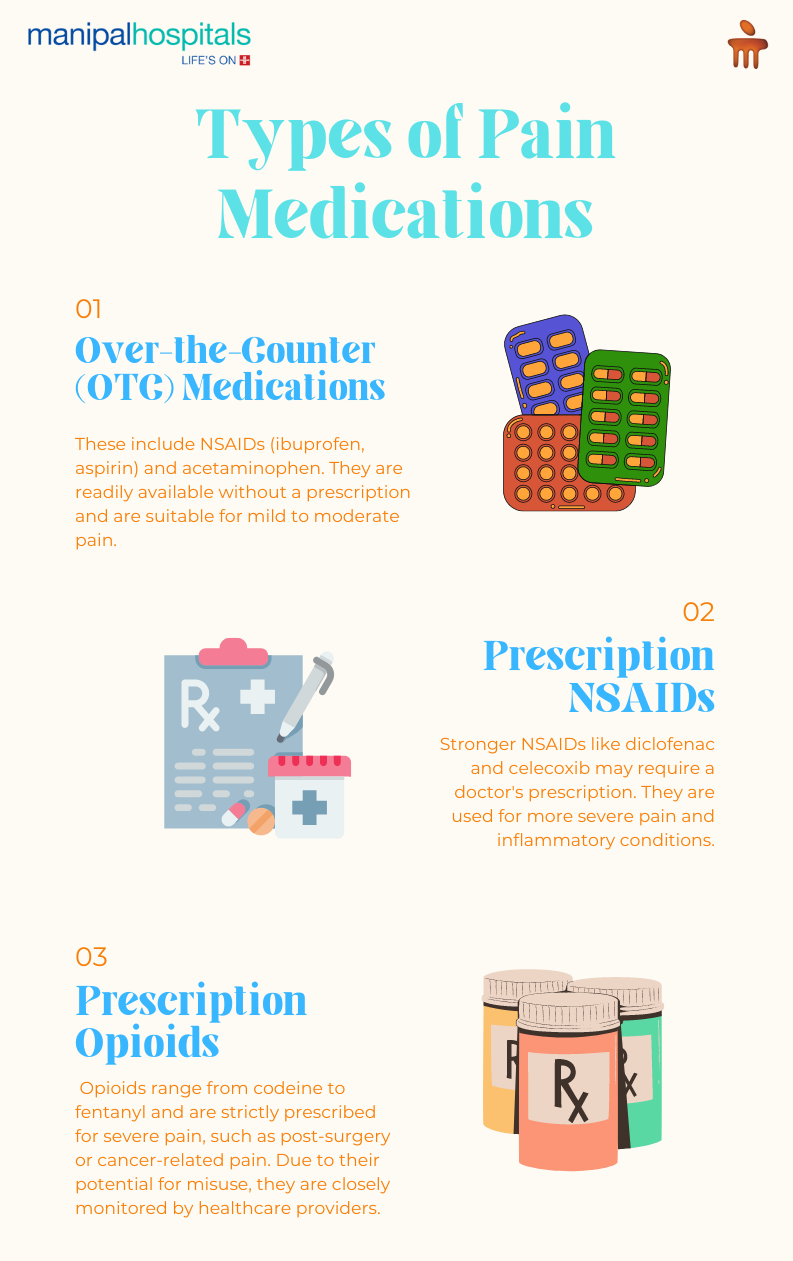
Pain medications, also known as analgesics, are a cornerstone of modern medicine, providing relief from discomfort caused by various conditions. From minor aches to chronic pain, these medications play a vital role in improving the quality of life for countless individuals. In this article, we'll delve into how pain medications work, explore different types available, and discuss potential side effects.
How Do Pain Medications Work?
Pain medications target the body's pain-signalling pathways to reduce or eliminate discomfort. They work through several mechanisms:
-
Nonsteroidal Anti-Inflammatory Drugs (NSAIDs): NSAIDs like ibuprofen and naproxen alleviate pain by blocking enzymes (COX-1 and COX-2) responsible for producing prostaglandins, which are chemicals that promote inflammation and pain.
-
Opioids: Opioids, such as morphine and oxycodone, bind to specific receptors in the brain and spinal cord, disrupting pain signals. They provide potent pain relief but carry a risk of dependence and side effects. Before taking these medicines, it is advisable to consult with the best neurologists in Bangalore at Manipal Hospitals.
-
Acetaminophen: Although the exact mechanism isn't fully understood, acetaminophen is believed to work by affecting the brain's pain centre and reducing fever. Unlike NSAIDs, it has minimal anti-inflammatory effects.
-
Antidepressants and Anticonvulsants: Certain medications used to treat depression and seizures can also manage chronic pain. They modify neurotransmitter activity, altering how the body perceives pain.
Mechanism of Action of Pain Medications
The mechanisms of action of each type of painkiller vary depending on the class of medication. Let’s understand the mechanisms for the three main classes of pain medications: Nonsteroidal Anti-Inflammatory Drugs (NSAIDs), opioids, and acetaminophen.
1. Nonsteroidal Anti-Inflammatory Drugs (NSAIDs)
NSAIDs work by inhibiting enzymes called cyclooxygenases (COX), specifically COX-1 and COX-2. These enzymes are responsible for producing prostaglandins, which are hormone-like substances involved in inflammation, pain, and fever. NSAIDs block the production of prostaglandins, leading to reduced inflammation and pain.
-
COX-1 Inhibition: COX-1 is present in many tissues and plays a role in maintaining normal physiological functions, including protecting the stomach lining and promoting platelet aggregation. Inhibition of COX-1 can lead to stomach irritation and increased bleeding tendency.
-
COX-2 Inhibition: COX-2 is primarily induced during inflammation and is associated with pain and swelling. Inhibiting COX-2 reduces these symptoms. Some NSAIDs are selective COX-2 inhibitors, which aim to provide pain relief while minimising stomach-related side effects.
2. Opioids
Opioids work by binding to specific receptors in the brain, spinal cord, and peripheral tissues known as opioid receptors. The major types of opioid receptors are mu (μ), delta (δ), and kappa (κ). The binding of opioids to these receptors disrupts the transmission of pain signals and alters the perception of pain. Activation of mu receptors provides potent pain relief, but it's also associated with side effects like respiratory depression, euphoria, and physical dependence.
3. Acetaminophen
The exact mechanism of acetaminophen isn't fully understood. It's believed to affect the endocannabinoid system in the brain, which plays a role in pain perception, appetite, and mood. Additionally, it may inhibit an enzyme in the brain that's involved in the synthesis of prostaglandins. Unlike NSAIDs, acetaminophen has minimal anti-inflammatory effects and primarily reduces pain and fever.
Types of Pain Medications

Pain medications can be categorised into three main groups:
-
Over-the-counter (OTC) Medications: These include NSAIDs (ibuprofen, aspirin) and acetaminophen. They are readily available without a prescription and are suitable for mild to moderate pain.
-
Prescription NSAIDs: Stronger NSAIDs like diclofenac and celecoxib may require a doctor's prescription from a reputed pain management clinic in Bangalore. They are used for more severe pain and inflammatory conditions.
-
Prescription Opioids: Opioids range from codeine to fentanyl and are strictly prescribed for severe pain, such as post-surgery or cancer-related pain. Due to their potential for misuse, they are closely monitored by healthcare providers.
Side Effects of Pain Medications
Pain medications, like any other medications, can come with side effects. The severity and likelihood of these side effects can vary based on the type of medication, dosage, duration of use, and individual factors. Here are some common side effects associated with different classes of pain medications:
1. Nonsteroidal Anti-Inflammatory Drugs (NSAIDs)
-
NSAIDs can irritate the stomach lining, leading to symptoms like heartburn, stomach pain, or even ulcers. Refer to the blog "How Does Your Heart Feel About Your Diet" to learn how your diet and medication may affect your health overall.
-
Prolonged use of NSAIDs, especially at higher doses, can increase the risk of gastrointestinal bleeding and ulcers.
-
NSAIDs can affect kidney function, potentially causing fluid retention and increased blood pressure.
-
Some individuals may experience allergic reactions, such as skin rashes, wheezing, or facial swelling.
2. Opioids
-
Opioids often cause constipation by slowing down the movement of the digestive tract.
-
Nausea and vomiting are common side effects, particularly when starting opioid treatment.
-
Opioids can cause drowsiness and impair coordination, affecting the ability to perform tasks safely.
-
High doses or misuse of opioids can lead to slowed breathing, which can be dangerous or even life-threatening.
-
Prolonged use of opioids can lead to physical dependence and addiction in some individuals.
3. Acetaminophen
-
Taking excessive doses of acetaminophen or combining it with alcohol can lead to liver damage or failure.
-
Although rare, some individuals may experience skin reactions or severe allergic responses.
4. Antidepressants and Anticonvulsants (Used for Pain)
-
These medications can cause drowsiness and dizziness, particularly when starting treatment or adjusting doses.
-
Some antidepressants may lead to weight gain over time.
-
Certain antidepressants can affect sexual desire and function.
With proper consultation with the pain medicine specialists in Bangalore, understanding how pain medications work and being aware of their potential side effects is essential for anyone seeking relief from discomfort. Whether it's the anti-inflammatory action of NSAIDs, the pain-altering effect of opioids, or the unique mechanism of acetaminophen, each class of medication comes with its benefits and considerations. However, it's crucial to approach pain management with a holistic perspective, considering not only medication but also lifestyle adjustments, physical therapy, and alternative treatments.





















 4 Min Read
4 Min Read








